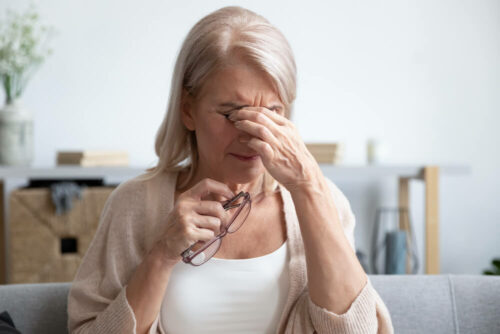Dry eye is a common medical condition affecting both eye health and quality of vision. Dryness occurs when there is an imbalance or lack of lubricating tears or protective lipid oils on the surface of the eye, also known as the tear film. Dryness can impact eye comfort and vision throughout the day with blurry vision, the appearance of red eyes, irritation and pain, including discomfort and intolerance of contact lenses. Think you may have dry eyes? Take our quiz and contact us.
86% of Patients with Dry Eye have MGD
Research has determined that the leading cause of eye discomfort for over 86% of patients with dry eye is related to blockage of the tiny glands in our eyelids known as meibomian glands, and not necessarily due to a lack of tear production. When you blink, the glands release this essential oil that acts as the front line of protection for the tears, lubricating the surface of the eyes. When these glands become blocked, the production of the necessary oils to protect the watery layer on the tear film is compromised thus causes this watery layer to evaporate and leave the eye surface exposed.

Understanding MGD, The Leading Cause of Dry Eye
A routine check for MGD as a part of any eye exam is recommended. MGD is progressive a disease but can be managed effectively if detected in its early stages. If left undetected. overtime results can be long-term structural damage of the glands and even permanent gland loss. When MGD occurs, the protective oil that normally flows from the eyelid’s meibomian glands slows or stops.
LipiFlow, A Proven MGD Treatment
The clinical science behind MGD as the primary cause of dry eye and its treatment is supported by over 25 years of scientific research. Gland blockages can be removed to restore proper gland function and reduce the progression of MGD, provided your gland structure is healthy. LipiFlow is the only FDA cleared treatment that properly heats the inside and outside of the eyelids while providing a gentle massaging action to properly remove gland blockages. Most patients receiving treatment notice improvement with symptoms over time but may need regular treatment every 1-2 years. The treatment is virtually painless and takes less than 12 minutes.

